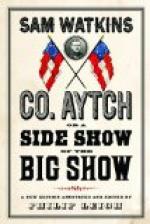“Why on earth don’t you sing like that on the stage?”
“Ah, if one only could,” she said, laughing, and taking him by the hand, she led him to the sofa and sat beside him as if for a long talk.
“Yes,” she said, “I’ve seen him. It’s all right.”
“I’m so glad. I hope you said something in my favour. I don’t want him to think me a brute, a villainous seducer, the man who ruined his daughter?”
“No, there was nothing of that kind.”
She began at first very gravely, but her natural humour overcame her, and she made him laugh, with her account of her wooing of her father, and the part the new harpsichord had played in their reconciliation delighted him. He was full of pleasant comments, gay and sympathetic; he was interested in her account of Ulick, and said he would like to know him. This pleased her, and looking into Owen’s eyes, she wondered if she should ask him to marry her. They talked of their friends, of the performance that night at the opera, and Evelyn thought that perhaps Owen ought not to go there lest he should meet her father, and she remembered that she had only to ask him to marry her in order to make it quite easy for him to meet her father. Every moment she thought she was going to ask him; she determined to introduce the subject in the first pause in the conversation, but when the pause came she didn’t or couldn’t; her tongue did not seem to obey her. She talked instead things that did not interest either her or him—the general principles of Wagner’s music, or some technicality, whether she should insist on the shepherd’s song being played on the English horn. At last she felt that she could not continue, so fictitious and strained did the conversation seem to her.
“Are you going already? I’ve not seen you for four days. We are dining to-morrow at Lady Merrington’s.”
Owen hoped that she would sing there the three songs which she had just sung so well, but she answered instantly that she did not think she would, that she wanted to sing Ulick’s songs. She knew that this second mention of Ulick’s name would rouse suspicion; she tried to keep it back, but it escaped her lips. She was sorry, for she did not think that she wished to annoy. She would not stop to lunch, though she could not urge any better reason than that Lady Duckle was waiting for her, and when he wished to kiss her, she turned her head aside; a moody look collected in her eyes, an ugly black resentment gathered in her heart; she was ashamed of herself, for there was nothing to warrant her being so disagreeable, and to pass the matter off, she described herself as being aggressively virtuous that morning.




